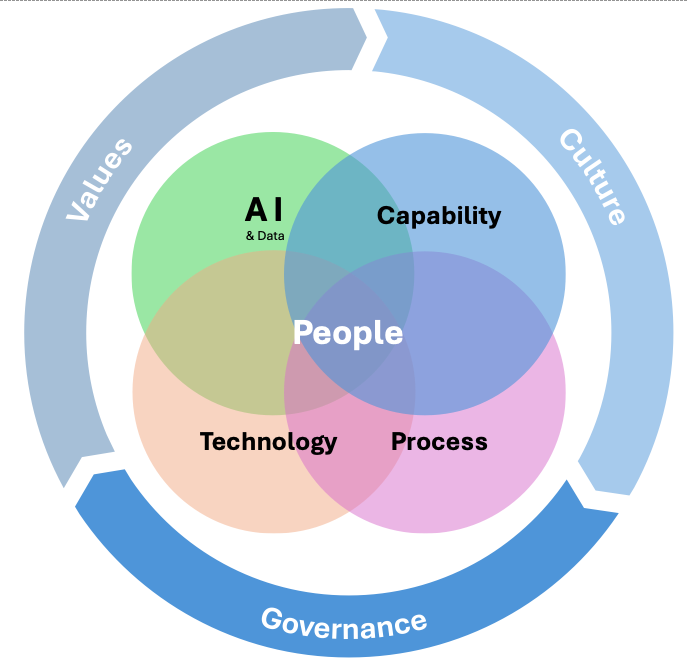AI or Applied AI? What’s the difference and why is it important?
Matt Dickson & David Yip | March 18, 2024
Employee capability using AI will be the key differentiator between industry leaders and laggards in this new AI era.
Artificial Intelligence (AI) is transforming industries and forcing a rethink of business and operating models. However, as business leaders investigate the opportunities and threats presented by this change, a critical distinction emerges between AI and Applied AI. Understanding this distinction is not just academic; it's foundational for any senior executive looking to harness AI's potential effectively.
The Essence of AI vs. Applied AI
AI is a fascinating technology, with seemingly magical capabilities—the algorithms, computational models, and systems capable of performing tasks that traditionally require human intelligence. This includes everything from understanding natural language to recognising useful patterns in data autonomously. Applied AI, on the other hand, is about leveraging this technology in real-world applications to solve specific business problems. It's the difference between developing a sophisticated machine learning model and using that model to improve customer service or streamline operations.
Why the Distinction Matters
The distinction between AI and Applied AI matters because it highlights a fundamental truth: technology alone is not a silver bullet. Success in the digital age requires not just technological or process innovation but their thoughtful application – in particular, how your people will become more productive, creative and resilient through the use of technology, with your customers and company to benefit.
- Strategic Alignment of Workforce Capabilities: Applied AI underscores the importance of not just aligning AI initiatives with strategic business objectives, but with workforce capabilities and organisational culture. It's about re-evaluating your business strategy and value proposition and re-aligning your enterprise resources and human capital for new opportunities and threats.
- Human Capital: Emphasising Applied AI brings human capital into focus. As AI technologies develop, the role of people in the organisation evolves. Businesses need to uplift and build new capabilities in their teams, ensuring they can confidently harness the power of AI as their “co-pilots” to deliver new value to the organisation.
- Cultural Shift and Experimentation: Adopting Applied AI necessitates a cultural shift towards experimentation and learning. Companies must foster an environment where staff at all levels – from frontline employees to board directors – are encouraged to engage with AI, understand its benefits, and contribute to its implementation.

Figure 1: The “People-Process-Technology” (PPT) framework updated for the AI-era
The Importance of Getting Hands-On
The need for hands-on experience with AI across the organisation cannot be overemphasised. This approach demystifies AI, making it more accessible and understandable to everyone. It also enables businesses to identify practical applications of AI that can drive immediate value from across the organisation.
Risks and Rewards
While the potential benefits of AI and Applied AI are vast, there are also risks to consider, including the implications of automation on the workforce, data privacy concerns, and the ethical use of AI technologies. Conversely, the risk of inaction—of failing to engage with AI—can leave businesses lagging in an increasingly competitive and technology-driven marketplace.
Calls to Action
For businesses looking to navigate the complexities of AI and Applied AI, the path forward involves strategic planning, investment in human capital, and a commitment to continuous learning and adaptation. Here are three calls to action:
- Strategic AI Roadmapping: Develop a comprehensive AI strategy that aligns both your business objectives and workforce capabilities. Identify areas where AI experimentation and learning can be done and outline a roadmap to further use case discovery and implementation strategies for scaling.
- Capability Building and Culture Change: Assess your organisation's readiness for AI, identify skill gaps, and design programs to uplift your team's capabilities in AI, data and digital, as well as new ways of working. This includes fostering a culture of innovation and experimentation.
- Ethical AI and Risk Management: Ensure your AI initiatives are ethically responsible, compliant with regulations, and equipped with robust risk management strategies to mitigate potential negative impacts.
Conclusion
Human capital and workforce transformation considerations are critical to harnessing AI's full potential and protecting your business future. By focusing on Applied AI and ensuring people are well-equipped with the skills and behaviours to flourish, companies can ensure that their investments in technology translate into real-world value, driving innovation, efficiency, and competitive advantage in the digital era. The journey toward AI excellence is complex and requires strategic vision, a commitment to human capital, and an unwavering focus on practical application.
To get started, assess your organisation’s readiness and workforce capability for AI. Establish a framework for experimentation and begin trials as soon as possible – for example, start 10 trials knowing most will fail the first time, but your people will benefit from the learning experience, and your culture will evolve.
With the right approach and expert guidance, businesses can navigate this journey successfully, unlocking new opportunities for growth and transformation of workforce capabilities. Get it wrong, and you will see reputational damage, poor decision-making, value destruction...
Acknowledgements
The primary source of content for this article was from experts in the Capability Network. AI tools were used to synthesise and accelerate document production.
About the Authors
Matt Dickson, Partner & Digital Transformation Leader
Matt is a visionary CIO and consultant with 30 years experience specialising in business and technology transformation. He has led high-performing teams in major telco, banking, transport and logistics, mining and construction corporations, driving growth and technological innovation. Matt’s expertise includes establishing new business products and functions enabled by technology, program assurance, managing financial risk, and IT turnarounds.
David Yip, Partner & AI and Education Leader
David is an entrepreneurial and visionary technology growth executive with over 20 years experience. He has held executive roles and consulted across education, government, finance, utilities, telco and retail. He specialises in developing innovative business growth strategies, implementing go-to-market and building new capabilities. David is a recognised expert in applied AI and digital transformation for businesses, education and government.

